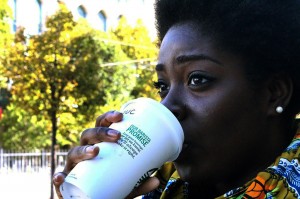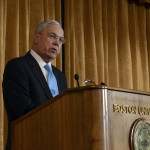
Coffee shops throughout Boston University’s campus in the month of October are participating in the “Kill the Cup Challenge,” a program designed to raise awareness and ultimately eliminate the use of disposable coffee cups.
Kill the Cup was started at the University of California, San Diego in 2013 by graduate students Drew Beal and Mike Taylor. What began as a game of encouraging coffee drinkers to share pictures of themselves drinking coffee from reusable cups on social media quickly became a nationwide program with the goal of eliminating waste and raising awareness about the detrimental effects of disposable-cup use on the environment, Beal said.
“We love to generate excitement around sustainability,” he said in an email. “We do indeed plan to address all reusable cup use. But coffee shops are a great place to start. More than half of adults drink coffee every day, so it’s a great way to reach the masses. And our goal is to expand Kill the Cup beyond college campuses.”
BU’s on-campus coffee shops, such as Pavement Coffeehouse and Blue State Coffee, are partaking in the program, as well as Starbucks in the George Sherman Union and the School of Management. The challenge, spearheaded by BU’s Net Impact, started Oct. 6 and will continue until the end of the month.
This is the first year Kill the Cup has come to BU, said Patricia Zundritsch, secretary of Net Impact Undergrad. Studies suggest 16 billion paper cups are sent to the landfill per year, and other studies have shown that number to be much higher, she said.
“Kill the Cup is about increasing the use of reusable mugs to combat the waste produced by coffee shops on campuses,” Zundritsch said in an email. “The ideal would be that every student considers ordering coffee in a reusable mug the norm and only needs a disposable cup if he or she forgot his cup, or decided to have coffee [or another beverage] unexpectedly.”
Disposable cups typically end up in the incinerator or the landfill, said Sabrina Pashtan, a spokeswoman for Sustainability@BU, which adds to climate change and greenhouse gas emissions.
“Dining Services is working with Net Impact to help market the program,” she said in an email. “We have seen a modest increase in reusable mug usage, but overall the numbers are quite low compared to other universities. BU students need to step it up and use their reusable mug.”
The BU community and the City of Boston have made concerted efforts to increase sustainability and create a more efficient, eco-friendly environment. On Oct. 1, the Commonwealth instated a food waste ban, utilizing composting and energy-generating technology to reduce waste.
On campus, BU has incorporated eco-friendly equipment and technology into its buildings, and has implemented ecological methods for BU Dining Services to reduce waste, such as recycling and composting. BU Dining Services also offers a discount of 25 cents on reusable mugs sold at locations that serve coffee campus-wide.
Beau Cotê, a senior at Northeastern University and a supervisor at the Pavement Coffeehouse on BU’s campus, said he supports the program and has become an active participant now that he is more aware of the detrimental effects that one-use cups can have on the environment.
“It [Kill the Cup] is important because our generation, compared to our parents’ generation, cares about climate change and the environment,” he said. “We’re worried about everything and the more you do, the better results you get.”
Cotê said he understands why people would not want to participate in the program, being that some cannot afford to spend the money on a reusable mug, which can often cost as much as $25.
“The sign has done some damage,” he said. “People see it and agree with it, but nothing really changes. I haven’t seen an influx of people bringing in their own mugs, about the same as usual.”
Nicolas Bachicha, a freshman in Sargent College of Health and Rehabilitation Sciences and an employee at the Starbucks in SMG, said he also has not noticed an influx of students rushing in with travel mugs to get the discount at the coffee shop.
“Regulars at Starbucks bring in their own [reusable mugs], but students in a hurry on their way to class don’t usually bother,” he said. “Older people and regulars definitely do bring in their own mugs.”
Parker Flores, a freshman in the College of General Studies, said he is an avid coffee drinker, and although he just learned about Kill the Cup, he plans on participating in it.
“Not many people know that it’s going on. Sure, they have signs by the register, but I don’t think people focus on what is going on by the register, just their order,” he said. “Maybe if these places posted signs in the window before people go in, they’d get more people doing it.”
Despite the low turnout, Flores said the Kill the Cup Challenge at BU should not be discontinued.
“We don’t lose anything by keeping it here, then why discontinue it?” he asked. “I feel that people don’t use it because people don’t understand or know about it, so if it continued, then maybe more people would learn about it.”

